Cancer Donation Letter
Subject: Donation for Cancer Research and Support
Dear [Recipient's Name],
I hope this letter finds you in good health and high spirits. I am writing to express my deep admiration and support for the incredible work being done by [Organization Name] in the field of cancer research and support. As someone who has personally witnessed the devastating impact of cancer on individuals and their families, I firmly believe in the importance of your organization's mission.
I have been following the remarkable achievements of [Organization Name] over the years and have been consistently impressed by the dedication and passion demonstrated by your team. Your commitment to advancing scientific knowledge, developing innovative treatments, and providing much-needed support to cancer patients and their loved ones is truly commendable.
Recognizing the immense challenges faced by cancer patients, I would like to contribute to your cause and assist in making a difference. Enclosed with this letter is a donation of [Amount of Donation]. I understand that every contribution, regardless of its size, can make a significant impact and help further your vital work.
I would also like to explore opportunities for volunteering my time and skills to support your organization. I firmly believe that by actively engaging with individuals affected by cancer and participating in your initiatives, I can contribute more effectively to your cause. Please let me know if there are any volunteer programs or events where my assistance would be valuable.
Moreover, I would be grateful if you could provide me with information about upcoming fundraising campaigns, events, or initiatives that I can promote within my personal and professional networks. I am passionate about raising awareness and generating support for cancer research and support services, and I am committed to leveraging my resources to mobilize others in this effort.
Lastly, I kindly request that you keep me informed about the progress and impact of the projects and programs funded by my donation. I am eager to witness firsthand the transformative power of your work and share the success stories with others to inspire further support.
Once again, I would like to extend my heartfelt appreciation to you and your team for the incredible work you do in fighting against cancer. I firmly believe that together, we can make a significant difference in the lives of those affected by this devastating disease.
Thank you for your time and consideration. I look forward to continuing my involvement and support for [Organization Name].
Sincerely,
[Your Name]
Formal Cancer Donation Request Letter
Dear [Recipient Name],
I am writing to request your support in our ongoing fight against cancer. [Organization Name] is dedicated to providing research, treatment, and support for cancer patients, and your contribution can make a significant difference.
We humbly ask for your donation to help us continue our work. Your generosity will directly impact the lives of patients and their families. Thank you for considering our request.
Sincerely,
[Your Name]
[Position]
[Organization Name]
Heartfelt Cancer Donation Letter
Dear [Recipient Name],
Every day, countless individuals and families face the challenges of cancer. At [Organization Name], we strive to provide hope, care, and vital resources to those in need.
Your donation, no matter the size, can help fund research, patient care, and awareness campaigns. Together, we can make a real difference in the fight against cancer. Thank you for your generosity and compassion.
Warm regards,
[Your Name]
[Position]
[Organization Name]
Casual Cancer Donation Email
Subject: Help Us Fight Cancer
Hi [Recipient Name],
We’re reaching out to ask for your support in helping those affected by cancer. Your donation to [Organization Name] will fund essential care and research programs.
Every contribution counts and brings hope to patients and families. Thank you for standing with us.
Best,
[Your Name]
[Organization Name]
Provisional Donation Request Letter
Dear [Recipient Name],
This letter serves as a provisional request for your support towards [Organization Name]'s cancer initiatives. Pending final approval and campaign planning, your early donation can help us initiate critical programs immediately.
We will provide detailed follow-up and acknowledgment upon confirmation of your contribution. Thank you for considering this request.
Sincerely,
[Your Name]
[Position]
[Organization Name]
Informal Fundraising Message for Cancer
Hi [Recipient Name],
We’re raising funds for cancer research and support at [Organization Name]. Any donation you can make will directly help patients and families in need.
Your support means the world—thank you for being part of this cause!
Cheers,
[Your Name]
Creative Cancer Donation Letter
Dear [Recipient Name],
Imagine a world where every cancer patient has access to treatment, care, and hope. At [Organization Name], we work tirelessly to make this vision a reality.
Your donation can light the path for countless individuals battling cancer. Together, we can change lives and create hope where it is most needed.
Warm regards,
[Your Name]
[Position]
[Organization Name]
Urgent Cancer Donation Appeal Letter
Dear [Recipient Name],
Time is critical in the fight against cancer. [Organization Name] urgently seeks your support to fund life-saving research and patient care.
Your immediate donation can have a tangible impact on the lives of those currently struggling. We deeply appreciate any contribution you can make.
Sincerely,
[Your Name]
[Position]
[Organization Name]
What is a Cancer Donation Letter and Why You Need It
A cancer donation letter is a formal or informal request for financial support aimed at funding cancer research, patient care, or awareness programs.
Purpose:
- Raise funds for research, treatment, and patient support.
- Increase awareness of ongoing cancer initiatives.
- Build relationships with donors for continued support.
- Encourage community engagement in a meaningful cause.
Who Should Send a Cancer Donation Letter
- Representatives of cancer research organizations.
- Hospitals or clinics with cancer support programs.
- Nonprofit organizations focused on healthcare or patient assistance.
- Community leaders or campaign organizers for fundraising events.
Whom Should Receive a Cancer Donation Letter
- Individual donors, philanthropists, and community supporters.
- Corporations and businesses with corporate social responsibility programs.
- Foundations or grant-giving institutions focused on healthcare.
- Government or public sector entities providing funding for medical research.
When to Send a Cancer Donation Letter
- During annual fundraising campaigns.
- In response to a new cancer research initiative or urgent need.
- Ahead of events such as charity drives, marathons, or galas.
- After recent breakthroughs or progress to update donors and request continued support.
How to Write and Send a Cancer Donation Letter
- Start with a compelling introduction explaining the purpose of the donation.
- Highlight the impact of past contributions and the difference donations make.
- Clearly state how donations will be used (research, treatment, patient support).
- Include a call-to-action, such as links for online donations or mailing instructions.
- Choose an appropriate tone: formal, heartfelt, creative, or urgent depending on the audience.
- Send via email for quick reach or as printed letters for formal donor engagement.
Requirements and Prerequisites Before Sending
- Accurate details of the organization, programs, and initiatives.
- Verification of tax-deductible status or donor benefits if applicable.
- Clear understanding of donation channels and instructions.
- Compelling story or statistics to demonstrate the impact of donations.
Formatting and Style Guidelines
- Length: 1–2 pages or concise email format.
- Tone: formal for institutions, heartfelt or creative for individuals.
- Wording: clear, persuasive, and emotionally engaging.
- Structure: greeting, introduction, impact description, donation request, closing.
- Mode: email, printed letter, or social media messaging depending on audience.
- Etiquette: polite, respectful, and appreciative; avoid guilt-tripping language.
Common Mistakes to Avoid
- Lack of clarity about how funds will be used.
- Overly long or unfocused letters that lose donor interest.
- Using a tone that is too aggressive or guilt-inducing.
- Forgetting to include donation instructions or contact information.
- Sending without personalizing for the recipient.
Tricks and Tips for Effective Cancer Donation Letters
- Include specific stories or examples of patients impacted.
- Use statistics to show measurable outcomes from donations.
- Personalize letters with the donor's name and previous contributions if known.
- Keep language simple, emotional, and compelling.
- Use urgency strategically for time-sensitive campaigns.
- Follow up with thank-you messages after donations.
Elements and Structure of a Cancer Donation Letter
- Greeting addressed to the potential donor.
- Introduction stating the purpose of the donation request.
- Impact section explaining how contributions make a difference.
- Donation request with specific instructions or options.
- Closing expressing gratitude and anticipation of support.
- Contact information for queries or confirmation.
- Signature of organization representative.
After Sending a Cancer Donation Letter
- Confirm receipt with donors if possible.
- Send acknowledgment or thank-you letters for contributions.
- Track donations and provide transparency on how funds are used.
- Plan follow-up campaigns or updates on progress to maintain engagement.
FAQ About Cancer Donation Letters
- Q: Can donations be made online through these letters?
A: Yes, include secure links or instructions for online donations. - Q: Should letters be personalized for each donor?
A: Personalization increases engagement and response rates. - Q: Is it appropriate to use emotional stories?
A: Yes, but balance emotion with factual information to maintain credibility. - Q: How often should donation letters be sent?
A: Typically during key campaigns, events, or when new initiatives arise. - Q: Are printed letters more effective than emails?
A: Both have value; printed letters are formal, emails are fast and cost-effective.

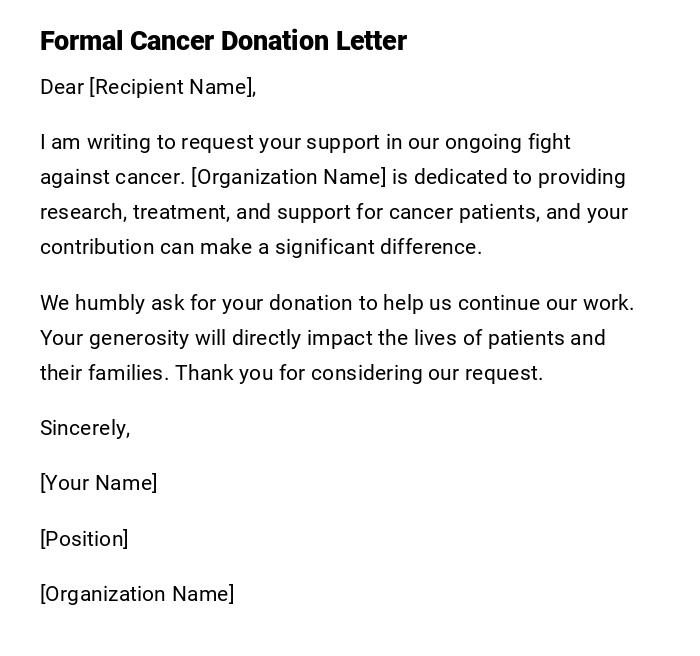
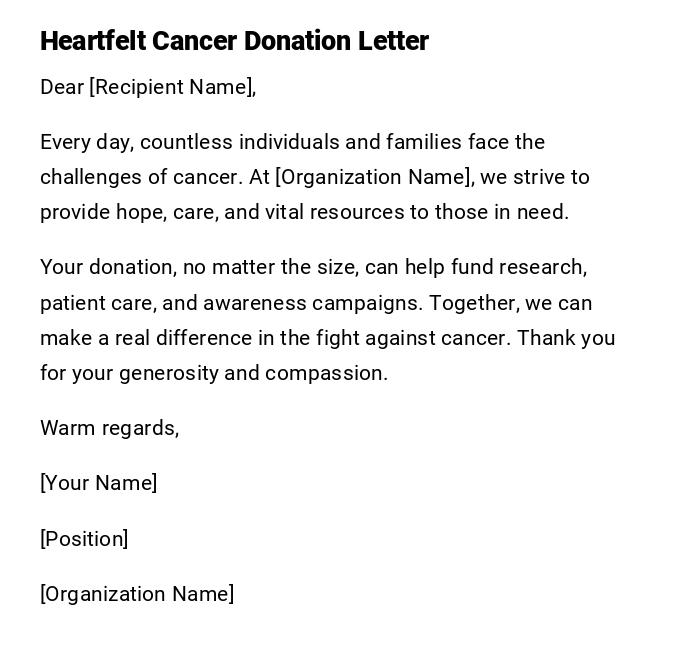
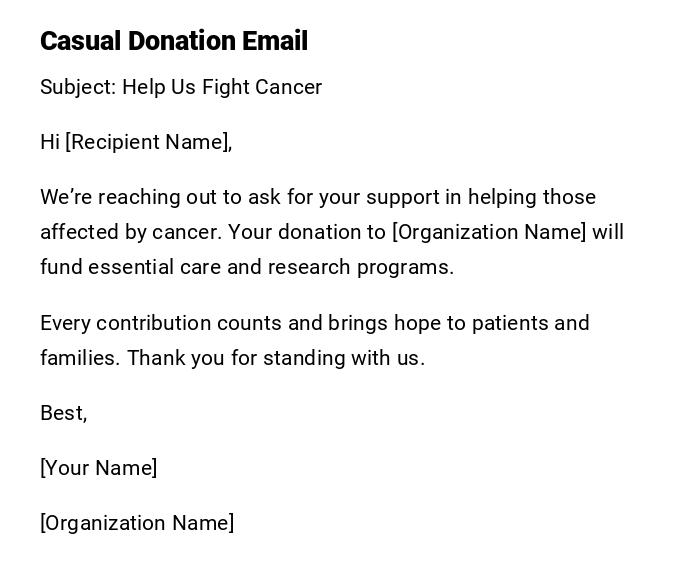
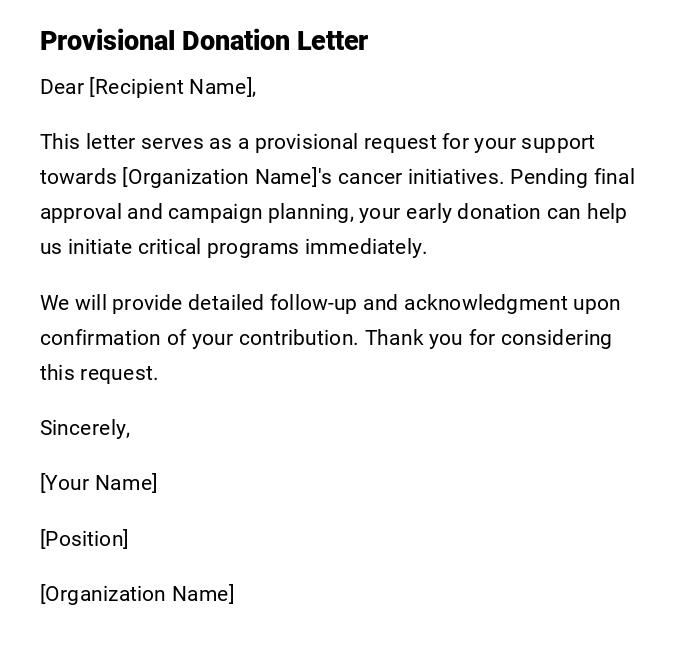
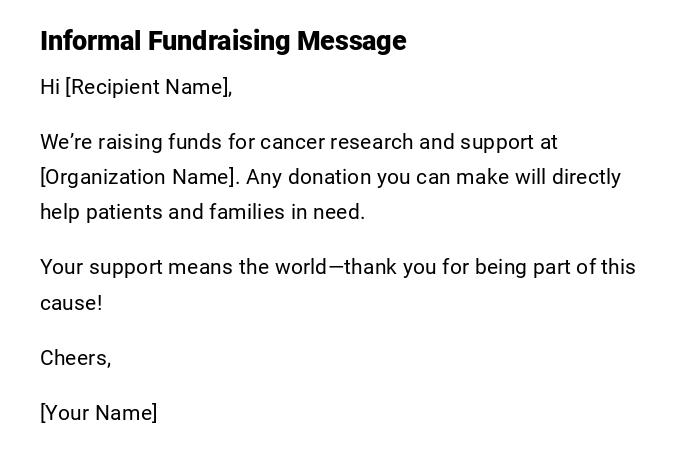
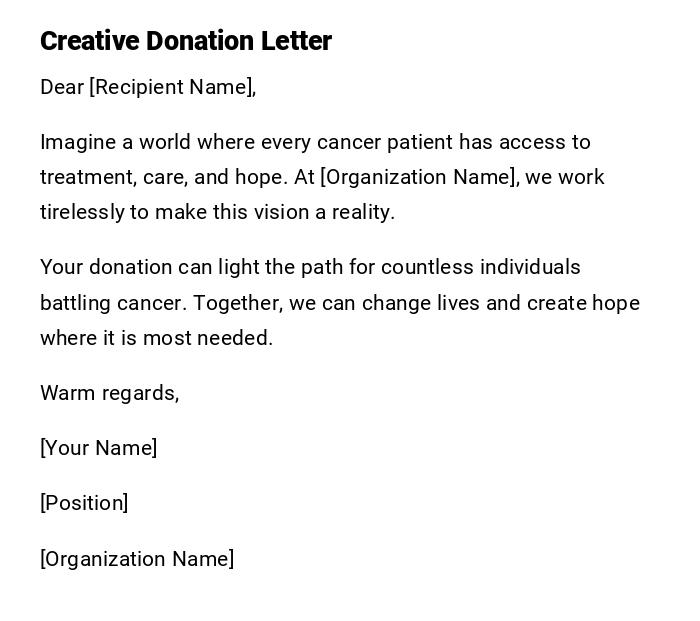
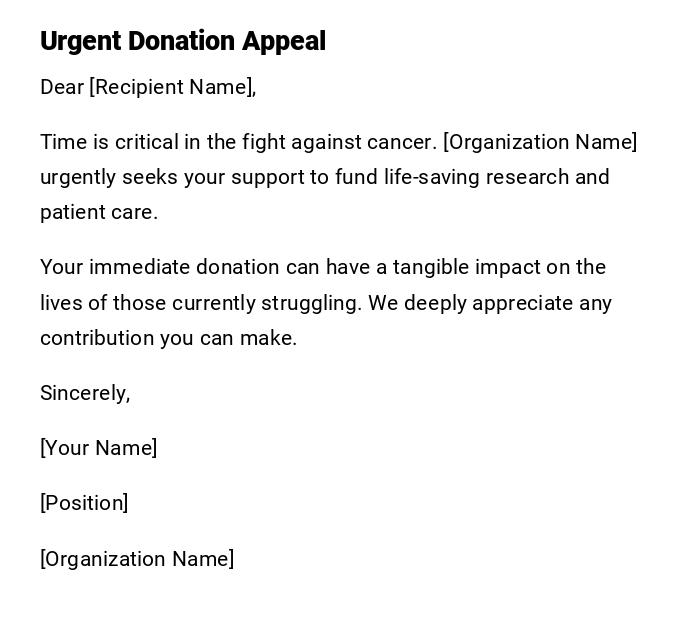

 Download Word Doc
Download Word Doc
 Download PDF
Download PDF